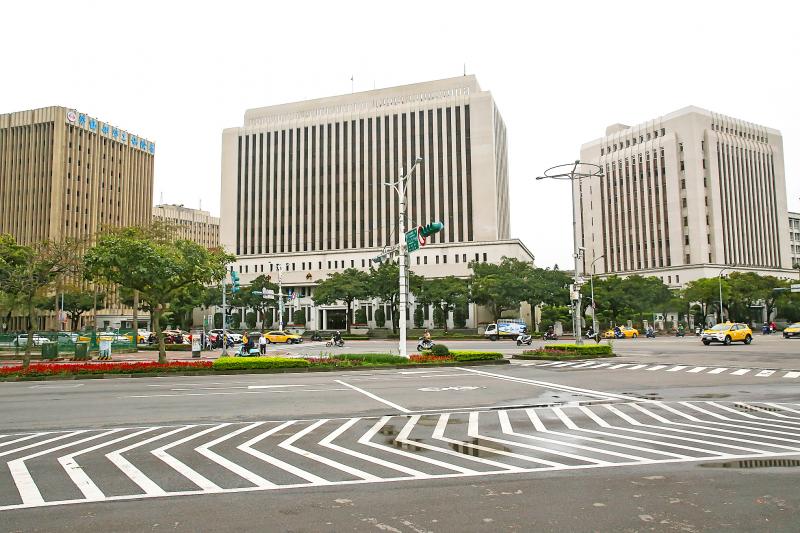The central bank on Sunday issued a rare statement to dismiss claims by Japan’s Nomura Securities Co that six economies, including Taiwan’s, are vulnerable to financial crises over the next three years given rising bubble signs.
Nomura said that its proprietary indicator showed that Taiwan, Germany, Japan, the Netherlands, Sweden and the US are susceptible to financial crises over the next 12 quarters, judging by their ratios of private credit to GDP ratios, debt service ratios, equity prices, property prices and effective foreign-exchange rates.
A Singapore-based research team at Nomura raised the alarm based on Cassandra data modeling, which it said has correctly predicted two-thirds of the past 53 crises in 40 countries since the early 1990s.

Photo: Bloomberg
“The Nomura report is inaccurate regarding Taiwan as it fails to understand that healthy economic fundamentals, rather credit inflation, push up the nation’s five indicators,” the central bank said.
Trade tensions between the US and China, and the ensuing realignment of supply chains, has allowed Taiwanese firms to enjoy order transfers and an increase in bank loans resulting mainly from companies shifting production lines home from China, the central bank added.
The continuation of money printing by major central banks helps drive up property prices in Taiwan, and the central bank has introduced selective credit controls to slow the pace, it said, adding that bad loans from real-estate lending are low.
Although Taiwanese lenders have increased loans to small and medium-sized borrowers to help them manage the pains induced by the COVID-19 pandemic, all loans are covered by the Small and Medium Enterprise Credit Guarantee Fund of Taiwan (信保基金), it added.
The central bank dismissed concerns over asset price bubbles in Taiwan, saying that strong corporate earnings and a bright outlook for exports account for the rallies in the local bourse this year and last year.
The appreciation in the local currency has more to do with export-driven current account surpluses rather than hot money influxes, it said, adding that it would intervene whenever it spots abnormal fund movements that could destabilize the foreign-exchange market.
“Overall, Taiwan is not in danger of having a financial crisis,” the bank said, adding that banks and life insurance companies all report improving profitability and capital adequacy.

The US dollar was trading at NT$29.7 at 10am today on the Taipei Foreign Exchange, as the New Taiwan dollar gained NT$1.364 from the previous close last week. The NT dollar continued to rise today, after surging 3.07 percent on Friday. After opening at NT$30.91, the NT dollar gained more than NT$1 in just 15 minutes, briefly passing the NT$30 mark. Before the US Department of the Treasury's semi-annual currency report came out, expectations that the NT dollar would keep rising were already building. The NT dollar on Friday closed at NT$31.064, up by NT$0.953 — a 3.07 percent single-day gain. Today,

‘SHORT TERM’: The local currency would likely remain strong in the near term, driven by anticipated US trade pressure, capital inflows and expectations of a US Fed rate cut The US dollar is expected to fall below NT$30 in the near term, as traders anticipate increased pressure from Washington for Taiwan to allow the New Taiwan dollar to appreciate, Cathay United Bank (國泰世華銀行) chief economist Lin Chi-chao (林啟超) said. Following a sharp drop in the greenback against the NT dollar on Friday, Lin told the Central News Agency that the local currency is likely to remain strong in the short term, driven in part by market psychology surrounding anticipated US policy pressure. On Friday, the US dollar fell NT$0.953, or 3.07 percent, closing at NT$31.064 — its lowest level since Jan.

The New Taiwan dollar and Taiwanese stocks surged on signs that trade tensions between the world’s top two economies might start easing and as US tech earnings boosted the outlook of the nation’s semiconductor exports. The NT dollar strengthened as much as 3.8 percent versus the US dollar to 30.815, the biggest intraday gain since January 2011, closing at NT$31.064. The benchmark TAIEX jumped 2.73 percent to outperform the region’s equity gauges. Outlook for global trade improved after China said it is assessing possible trade talks with the US, providing a boost for the nation’s currency and shares. As the NT dollar

The Financial Supervisory Commission (FSC) yesterday met with some of the nation’s largest insurance companies as a skyrocketing New Taiwan dollar piles pressure on their hundreds of billions of dollars in US bond investments. The commission has asked some life insurance firms, among the biggest Asian holders of US debt, to discuss how the rapidly strengthening NT dollar has impacted their operations, people familiar with the matter said. The meeting took place as the NT dollar jumped as much as 5 percent yesterday, its biggest intraday gain in more than three decades. The local currency surged as exporters rushed to